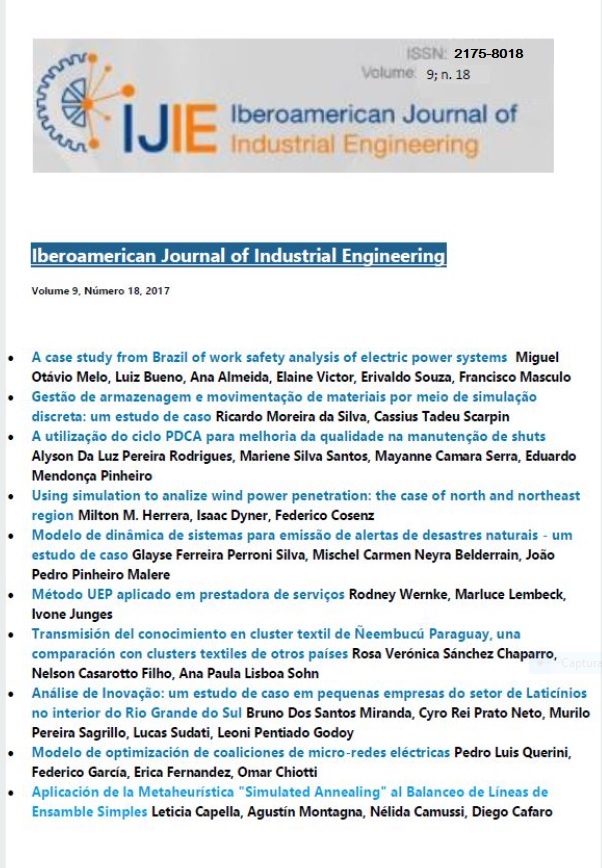Using simulation to analize wind power penetration: the case of north and northeast region
Palavras-chave:
System dynamics, Brazil, Wind power, Supply chain, Electricity priceResumo
Brazil is rich in renewable sources that can be used for energy generation. The renewable source of energy generation predominantly in Brazil is hydropower. However, the availability of hydropower depends on the useful volume reserves, which is subject to rainfall. Consequently, wind power is a renewable source that is being integrated into the electricity-interconnected system in Brazil. The growth of wind power generation depends on the financial resources and the delays in transmission projects. Despite the Brazilian incentives policy in wind power, the insufficient of transmission infrastructure affects to electricity price in electricity market. This paper addresses the effects of the insufficient of transmission on electricity price through a simulation model. The developed model is implemented to analyze the region of North and Northeast Brazil.Referências
ABRELL, B. J.; RAUSCH, S. Cross-Country Electricity Trade , Renewable Energy and European Transmission Infrastructure Policy. Journal of Environmental Economics and Management, 2016.
ANEEL. Matriz de Energia Eléctrica. DisponÃvel em: .
ARANGO, S.; DYNER, I.; LARSEN, E. R. Lessons from deregulation: Understanding electricity markets in South America. Utilities Policy, v. 14, n. 3, p. 196–207, 2006.
CARDENAS, L. M.; FRANCO, C. J.; DYNER, I. Assessing emissions-mitigation energy policy under integrated supply and demand analysis: The Colombian case. Journal of Cleaner Production, v. 112, p. 3759–3773, 2016.
CORRÊA DA SILVA, R.; DE MARCHI NETO, I.; SILVA SEIFERT, S. Electricity supply security and the future role of renewable energy sources in Brazil. Renewable and Sustainable Energy Reviews, v. 59, p. 328–341, 2016.
DE MELO, C. A.; JANNUZZI, G. D. M.; BAJAY, S. V. Nonconventional renewable energy governance in Brazil: Lessons to learn from the German experience. Renewable and Sustainable Energy Reviews, v. 61, p. 222–234, 2016.
DYNER, I.; LARSEN, E. R. From planning to strategy in the electricity industry. Energy Policy, v. 29, n. 13, p. 1145–1154, 2001.
FRANCO, C. J.; CASTANEDA, M.; DYNER, I. Simulating the new British Electricity-Market Reform. European Journal of Operational Research, v. 245, n. 1, p. 273–285, 2015.
HANNON, M. J.; FOXON, T. J.; GALE, W. F. “Demand pull†government policies to support Product-Service System activity: the case of Energy Service Companies (ESCos) in the UK. Journal of Cleaner Production, v. 108, p. 900–915, 2015.
HENAO, F. et al. A multicriteria approach to sustainable energy supply for the rural poor. European Journal of Operational Research, v. 218, n. 3, p. 801–809, 2012.
HERRERA, M. M.; ORJUELA CASTRO, J. A. Perspectiva de trazabilidad en la cadena de suministros de frutas : un enfoque desde la dinámica de sistemas. IngenierÃa, v. 19, n. 2, p. 63–84, 2014.
KISSEL, J. M.; KRAUTER, S. C. W. Adaptations of renewable energy policies to unstable macroeconomic situations-Case study: Wind power in Brazil. Energy Policy, v. 34, n. 18, p. 3591–3598, 2006.
LUNA-REYES, L. F.; ANDERSEN, D. L. Collecting and analyzing qualitative data for system dynamics: Methods and models. System Dynamics Review, v. 19, n. 4, p. 271–296, 2003.
OLIVA, R. Model calibration as a testing strategy for system dynamics models. European Journal of Operational Research, v. 151, n. 3, p. 552–568, 2003.
ORJUELA, J.; HERRERA, M. M.; CASILIMAS, W. Impact analysis of transport capacity and food safety in Bogota. Workshop Engineering Application. Anais...2015
PEREIRA, A. O. et al. Strategies to promote renewable energy in Brazil. Renewable and Sustainable Energy Reviews, v. 15, n. 1, p. 681–688, 2011.
PEREIRA, M. G. et al. The renewable energy market in Brazil: Current status and potential. Renewable and Sustainable Energy Reviews, v. 16, n. 6, p. 3786–3802, 2012.
QUDRAT-ULLAH, H. Modelling and Simulation in Service of Energy Policy. Energy Procedia, v. 75, p. 2819–2825, 2015.
SILVA, N. F. DA et al. Wind energy in Brazil: From the power sector’s expansion crisis model to the favorable environment. Renewable and Sustainable Energy Reviews, v. 22, p. 686–697, 2013.
STERMAN, J. D. Appropriate summary statistics for evaluating the historical fit of system dynamics modelsDynamica, 1984. DisponÃvel em: <http://www.systemdynamics.org/conferences/1983/proceed/plenary/sterm203.pdf>
STERMAN, J. D. Business dynamics: Systems Thinking and Modeling for a Complex World. [s.l.] McGraw-Hill, 2000.
TROOST, C.; WALTER, T.; BERGER, T. Climate, energy and environmental policies in agriculture: Simulating likely farmer responses in Southwest Germany. Land Use Policy, v. 46, p. 50–64, 2015.
WWF-BRASIL – FUNDO MUNDIAL PARA A NATUREZA. Desafios e oportunidades para a energia solar fotovoltaica no Brasil : recomendações para polÃticas públicas. p. 44, 2015.
ZULUAGA, M. M.; DYNER, I. Incentives for renewable energy in reformed Latin-American electricity markets: the Colombian case. Journal of Cleaner Production, v. 15, n. 2, p. 153–162, 2007.
Downloads
Publicado
Como Citar
Edição
Seção
Licença
Os artigos publicados são de propriedade do IJIE – Iberoamerican Journal of Industrial Engineering, Revista Iberoamericana de Engenharia Industrial, Revista Iberoamericana de Ingeniería Industrial. Os autores são os responsáveis pelos conteúdos dos artigos. O IJIE não se responsabiliza ou endossa as opiniões emitidas pelos autores dos textos publicados, salientando que as opiniões são de exclusiva responsabilidade dos autores.
O periódico se reserva o direito de introduzir alterações no original, visando a manter a homogeneidade e a qualidade da publicação, respeitando, no entanto, o estilo e as opiniões dos autores. Essas alterações serão editoriais (correções gramaticais e adequações estilísticas) e não substanciais, de forma que não modifiquem o sentido do texto. As provas finais não serão enviadas aos autores, sendo o artigo publicado com os ajustes necessários.
Conforme citado neste site, no item “Caráter do IJIE”, os artigos são de uso gratuito, com atribuições próprias em aplicações educacionais e não-comerciais. Uma nova publicação do mesmo texto, de iniciativa de seu autor ou de terceiros, fica sujeita à expressa menção da precedência de sua publicação neste periódico, citando-se a edição e a data dessa publicação.

